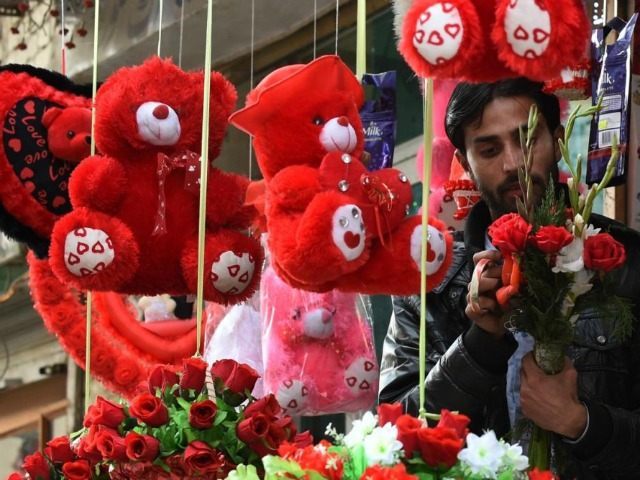Pakistani Minister for the Interior Chaudhry Nisar Ali Khan has ordered a ban on Valentine’s Day for the capital city of Islamabad, promising “strict action” against anyone caught engaged in outward celebration of the festivity.
Reports state the reason for the ban is that Muslim hardliners find the holiday to be an “insult to Islam,” and therefore, unworthy of a Muslim nation. In past years, the Islamist political party Jamaat-e-Islami had “disrupted” Valentine’s Day celebrations, but 2016 will be the first time that the celebration is officially banned.
Pakistan is not the only Muslim country cracking down on the Western—and originally Christian—feast day in commemoration of Saint Valentine.
As Breitbart reported Wednesday, the Indonesian city of Banda Aceh has also banned celebrations of Valentine’s Day, contending that the holiday violates Islamic law. The province of Aceh is the only region of the country ruled by Sharia law.
“Our society and the Muslim youth should certainly not be celebrating non-Islamic holidays,” declared Mayor Illiza Saaduddin Djamal. “The law says it is haram. The government is obliged to protect the public and younger generation from unlawful acts.”
The Indonesian ban extends to gifting flowers and chocolates to loved ones, as well as public displays with Valentine’s Day decorations.
Though Malaysia has not outlawed Valentine’s Day, in 2012, authorities arrested more than 40 unmarried Muslim couples who were sharing hotel rooms on February 14, and officials declared that celebrations were “unsuitable” for Muslims.
Iran, too, has called Valentine’s Day a “decadent Western custom” and outlawed celebrations in 2011. “Symbols of hearts, half-hearts, red roses, and any activities promoting this day are banned,” state media reported at the time. “Authorities will take legal action against those who ignore the ban.”
Pakistan has repeatedly come under fire from religious liberty advocates for its systematic violations of the rights of citizens.
Earlier this month, police allegedly tortured a Christian man to death, stripping him and beating him with logs in an attempt to make him confess to stealing from his Muslim employer.
Last October, the U.S. Commission on International Religious Freedom (USCIRF) called on the U.S. State Department to denounce Pakistan’s systematic religious persecution and add the country to its list of “Countries of Particular Concern” (CPC).
The list comprises those governments that “engage in or tolerate” systematic, ongoing, and egregious violations of religious freedom.
The State Department has resisted summons to have it denounce the Islamic nation more forcefully, presumably because it does not wish to disrupt its political alliance with the country. The U.S. named Pakistan a major non-NATO ally in 2002.
U.S. economic assistance to Pakistan reached its lowest level in the 1990s, after President George H.W. Bush suspended aid over Pakistan’s emerging nuclear program, but since 2001, U.S. financial assistance to Pakistan (both economic and military) has risen steadily.
In the ten-year period from 2001-2011, the U.S. Congress approved $20 billion in direct U.S. aid and military reimbursements to Pakistan.
During his presidency, Barack Obama has continued to call for increased economic aid to Pakistan, and the U.S. supports Pakistan even after revelations in 2011 that al-Qaeda founder Osama bin Laden had enjoyed years-long and relatively comfortable refuge inside the country.
Follow Thomas D. Williams on Twitter @tdwilliamsrome.

COMMENTS
Please let us know if you're having issues with commenting.